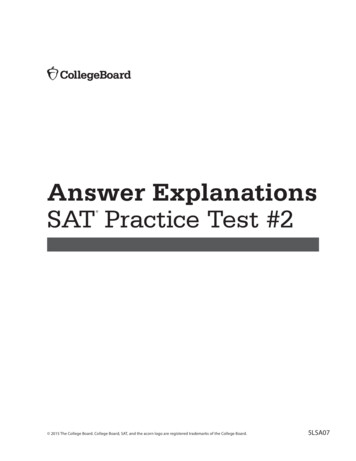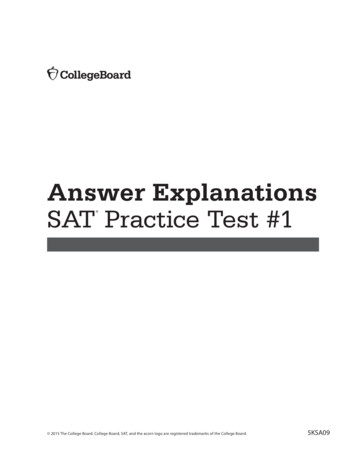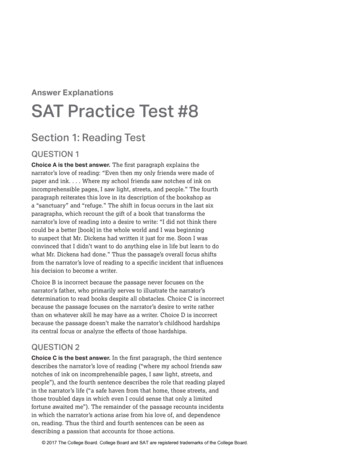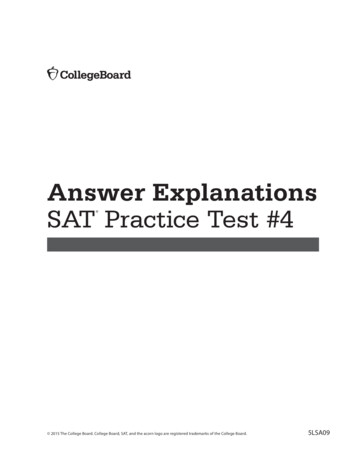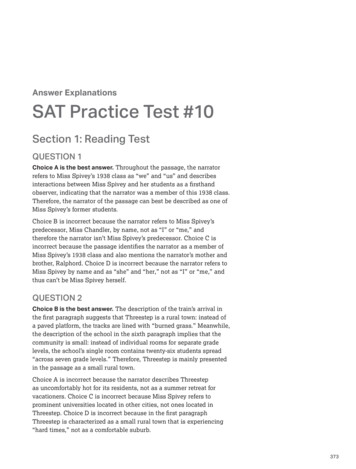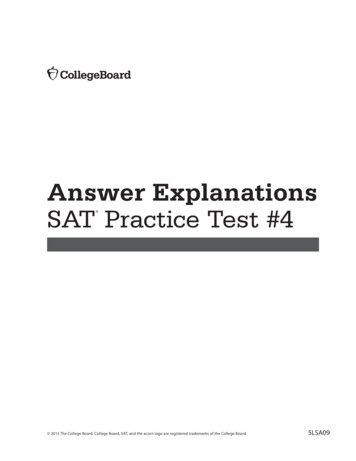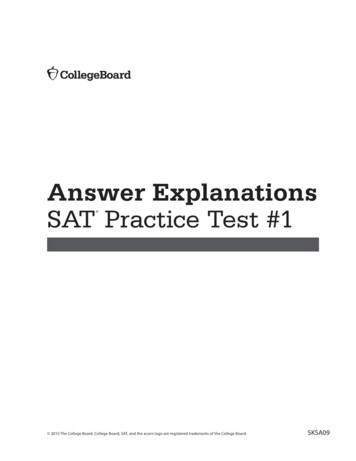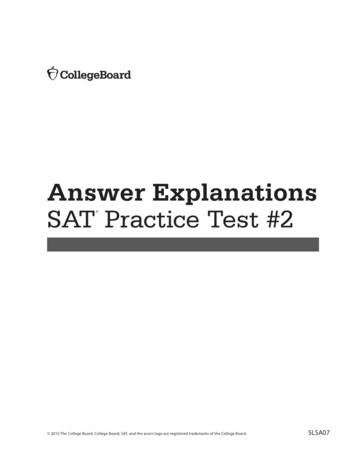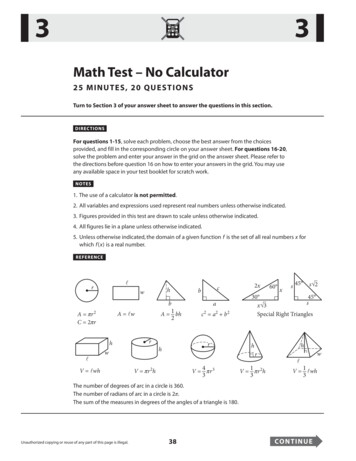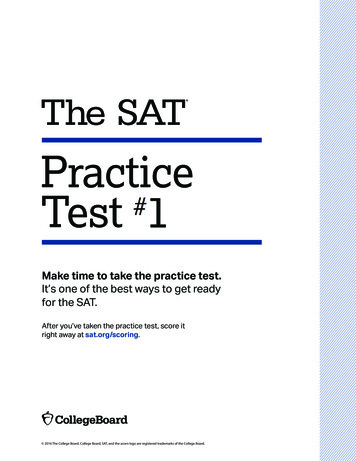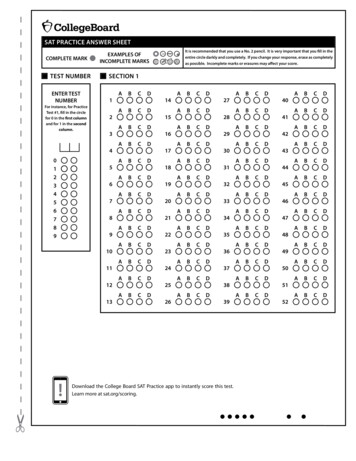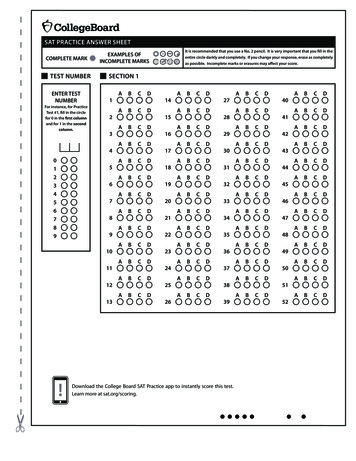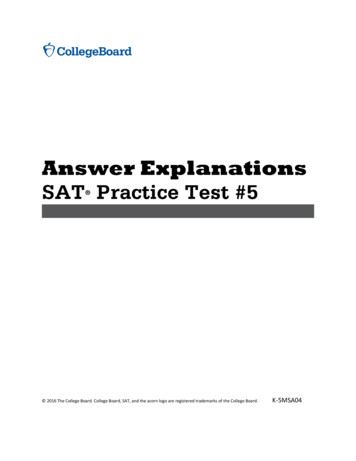
Transcription
Answer Explanations 2016 The College Board. College Board, SAT, and the acorn logo are registered trademarks of the College Board.K-5MSA04
Answer ExplanationsSection 1: Reading TestQUESTION 1Choice D is the best answer. The passage begins with the main character, Lymie, sitting in a restaurantand reading a history book. The first paragraph describes the book in front of him (“Blank pages frontand back were filled in with maps, drawings, dates, comic cartoons, and organs of the body,” lines 1113). The second paragraph reveals what Lymie is reading about (the Peace of Paris and the Congress ofVienna) and suggests his intense concentration on the book (“sometimes he swallowed whole the foodthat he had no idea he was eating,” lines 23-24). In the third paragraph, the focus of the passage shiftsto a description and discussion of others in the restaurant, namely “A party of four, two men and twowomen . . . ” (lines 42-43).Choice A is incorrect because the passage does not provide observations made by other characters, onlyoffering Lymie’s and the narrator’s observations. Choice B is incorrect because the beginning of thepassage focuses on Lymie as he reads by himself and the end of the passage focuses on the arrival ofLymie’s father, with whom Lymie’s relationship seems somewhat strained. Choice C is incorrect becausethe setting is described in the beginning of the first paragraph but is never the main focus of thepassage.QUESTION 2Choice C is the best answer. The main purpose of the first paragraph is to establish the passage’s settingby describing a place and an object. The place is the Alcazar Restaurant, which is described as being“long and narrow” and decorated with “art moderne,” murals, and plants (lines 2-6), and the object isthe history book Lymie is reading.Choice A is incorrect because rather than establishing what Lymie does every night, the first paragraphdescribes what Lymie is doing on one night. Choice B is incorrect because nothing in the first paragraphindicates when the passage takes place, as the details provided (such as the restaurant and the book)are not specific to one era. Choice D is incorrect because nothing in the first paragraph clearlyforeshadows a later event.QUESTION 3
Choice C is the best answer. The passage states that “when Lymie put down his fork and began to count. . . the waitress, whose name was Irma, thought he was through eating and tried to take his plate away”(lines 34-38). It is reasonable to assume that Irma thinks Lymie is finished eating because he is no longerholding his fork.Choice A is incorrect because Lymie has already been reading his book while eating for some timebefore Irma thinks he is finished eating. Choice B is incorrect because the passage doesn’t state thatLymie’s plate is empty, and the fact that Lymie stops Irma from taking his plate suggests that it is notempty. Choice D is incorrect because the passage gives no indication that Lymie asks Irma to clear thetable.QUESTION 4Choice A is the best answer. The passage makes it clear that Lymie finds the party of four who enter therestaurant to be loud and bothersome, as their entrance means he is no longer able to concentrate onhis book: “They laughed more than there seemed any occasion for . . . and their laughter was too loud.But it was the women’s voices . . . which caused Lymie to skim over two whole pages without knowingwhat was on them” (lines 52-59).Choices B, C, and D are incorrect because lines 55-59 make clear that Lymie is annoyed by the party offour, not that he finds their presence refreshing (choice B), thinks they resemble the people he isreading about (choice C), or thinks they represent glamour and youth (choice D).QUESTION 5Choice C is the best answer. The previous question asks about Lymie’s impression of the party of fourwho enter the restaurant, with the correct answer being that he finds them noisy and distracting. This issupported in lines 55-59: “But it was the women’s voices, the terrible not quite sober pitch of thewomen’s voices, which caused Lymie to skim over two whole pages without knowing what was onthem.”Choices A, B, and D are incorrect because the lines cited do not support the answer to the previousquestion about Lymie’s impression of the party of four who enter the restaurant. Rather than showingthat Lymie finds the group of strangers noisy and distracting, the lines simply describe how two of thefour people look (choices A and B) and indicate what Lymie does when his father joins him in therestaurant (choice D).QUESTION 6Choice A is the best answer. In the passage, Lymie closes his book only after “a coat that he recognizedas his father’s was hung on the hook next to his chair” (lines 67-68). It is Lymie’s father’s arrival thatcauses him to close the book.
Choices B, C, and D are incorrect because lines 67-70 of the passage clearly establish that Lymie closeshis book because his father has arrived, not that he does so because the party of four is too loud (choiceB), because he has finished reading a section of the book (choice C), or because he is getting ready toleave (choice D).QUESTION 7Choice D is the best answer. In lines 74-79, the narrator describes Mr. Peters as “gray” and balding,noting that he has “lost weight” and his color is “poor.” This description suggests Mr. Peters is aging andlosing strength and vigor.Choices A, B, and C are incorrect because the description of Mr. Peters in lines 74-79 suggests he is aperson who is wan and losing vitality, not someone who is healthy and in good shape (choice A), angryand intimidating (choice B), or emotionally anxious (choice C).QUESTION 8Choice B is the best answer. In the last paragraph of the passage, Mr. Peters is described as beingunaware “that there had been any change” in his appearance since he was younger (lines 80-81). Laterin the paragraph, the passage states that “the young man” Mr. Peters once was “had never for onesecond deserted” him (lines 90-91). The main idea of the last paragraph is that Mr. Peters still thinks ofhimself as young, or at least acts as if he is a younger version of himself.Choice A is incorrect because Mr. Peters is spending time with Lymie, his son, and there is no indicationthat he generally does not spend time with his family. Choice C is incorrect because although there arebrief mentions of a diamond ring and manicured fingers, the paragraph focuses on Mr. Peters’s overallappearance, not on his awareness of status symbols. Choice D is incorrect because the last paragraphclearly states that Mr. Peters is “not aware that there had been any change” and thinks of himself asyoung.QUESTION 9Choice B is the best answer. In lines 81-85, Mr. Peters is described as having “straightened his tie selfconsciously” and gestured with a menu “so that the two women at the next table would notice thediamond ring on the fourth finger of his right hand.” Mr. Peters’s actions are those of someone whowants to attract attention and be noticed.Choices A, C, and D are incorrect because the lines cited do not support the idea Mr. Peters wants toattract attention to himself. Choices A and C address Mr. Peters’s view of himself. Choice D indicatesthat Mr. Peters’s view of himself affects his behavior but does not reveal that he acts in a way meant todraw attention.QUESTION 10
Choice B is the best answer. The last sentence of the passage states that Mr. Peters’smischaracterization of himself makes him act in ways that are not “becoming” for a man of his age. Inthis context, “becoming” suggests behavior that is appropriate or fitting.Choices A, C, and D are incorrect because in the context of describing one’s behavior, “becoming”means appropriate or fitting, not becoming known (choice A), becoming more advanced (choice C), orsimply occurring (choice D).QUESTION 11Choice B is the best answer. In Passage 1, Beecher makes the point that even if women in her societyare perceived as being inferior to men, they are still able to effect considerable influence on that society:“But while woman holds a subordinate relation in society to the other sex, it is not because it wasdesigned that her duties or her influence should be any the less important, or all-pervading” (lines 6-10).Choice A is incorrect because Beecher describes the dynamic between men and women in terms of theway they can change society, not in terms of security and physical safety. Choice C is incorrect becauseeven though Beecher implies that women have fewer rights in society than men do, she doesn’t say thatwomen have fewer responsibilities. Choice D is incorrect because Beecher does not assert that womenare superior to men.QUESTION 12Choice A is the best answer. The previous question asks what point Beecher makes regarding therelationship between men and women in her society, with the answer being that women are consideredinferior but can still have influence. This is supported in lines 6-10: “But while woman holds asubordinate relation in society to the other sex, it is not because it was designed that her duties or herinfluence should be any the less important, or all-pervading.”Choices B, C, and D are incorrect because the lines cited do not support the answer to the previousquestion about the point Beecher makes regarding the relationship between men and women in hersociety. Instead, they describe ways men can affect society (choices B and C) and explain how certainactions undertaken by a woman can be viewed negatively (choice D).QUESTION 13Choice B is the best answer. In the third paragraph (lines 22-37), Beecher suggests that women can be“so much respected, esteemed and loved” by those around them that men will accede to their wishes:“then, the fathers, the husbands, and the sons, will find an influence thrown around them, to which theywill yield not only willingly but proudly . . . .” These lines show that Beecher believes women caninfluence society by influencing the men around them; in other words, women have an indirectinfluence on public life.
Choices A, C, and D are incorrect because lines 34-37 make it clear that Beecher believes women dohave an effect on society, even if it is an indirect effect. Beecher does not indicate that women’s effecton public life is ignored because most men are not interested (choice A), unnecessary because men donot need help governing society (choice C), or merely symbolic because women tend to be idealistic(choice D).QUESTION 14Choice D is the best answer. Regarding the dynamic of men and women in society, Beecher says thatone sex is given “the subordinate station” while the other is given the “superior” station (lines 1-2). Inthe context of how one gender exists in comparison to the other, the word “station” suggests a standingor rank.Choices A, B, and C are incorrect because in the context of the relative standing of men and women inBeecher’s society, the word “station” suggests a standing or rank, not a physical location or area(choices A, B, and C).QUESTION 15Choice C is the best answer. When describing how men and women can influence society, Beecher saysthe ways they can do so “should be altogether different and peculiar” (lines 11-12). In the context of the“altogether different” ways men and women can influence society, the word “peculiar” implies beingunique or distinctive.Choices A, B, and D are incorrect because in the context of the “altogether different” ways men andwomen can influence society, the word “peculiar” suggests something unique or distinctive, notsomething unusual and odd (choice A), unexpected (choice B), or rare (choice D).QUESTION 16Choice A is the best answer. In Passage 2, Grimké makes the main point that people have rights becausethey are human, not because of their gender or race. This is clear in lines 58-60, when Grimké states that“human beings have rights, because they are moral beings: the rights of all men grow out of their moralnature” and lines 65-68, when Grimké writes, “Now if rights are founded in the nature of our moralbeing, then the mere circumstance of sex does not give to man higher rights and responsibilities, than towoman.”Choices B, C, and D are incorrect because Grimké primarily emphasizes that all men and womeninherently have the same rights (“rights are founded in the nature of our moral being,” lines 65-66). Hercentral claim is not that men and women need to work together to change society (choice B), that moralrights are the distinguishing characteristic separating humans from animals (choice C), or that thereshould be equal opportunities for men and women to advance and succeed.QUESTION 17
Choice B is the best answer. In Passage 2, Grimké makes the point that human rights are not fleeting orchangeable but things that remain, regardless of the circumstances, because they are tied to humans’moral nature. She emphasizes that human rights exist even if societal laws attempt to contradict oroverride them, citing slavery as an example: “These rights may be wrested from the slave, but theycannot be alienated: his title to himself is as perfect now, as is that of Lyman Beecher: it is stamped onhis moral being, and is, like it, imperishable” (lines 61-65).Choices A and D are incorrect because in Passage 2, Grimké makes the point that human rights areinherent and unchanging, not that they are viewed differently in different societies (choice A) or thatthey have changed and developed over time (choice D). Choice C is incorrect because Grimké doesn’tdescribe a clash between human rights and moral responsibilities; instead, she says that humans haverights “because they are moral beings” (lines 58-59).QUESTION 18Choice B is the best answer. The previous question asks what point Grimké makes about human rightsin Passage 2, with the answer being that they exist and have moral authority whether or not they areestablished by societal law. This is supported in lines 61-65: “These rights may be wrested from theslave, but they cannot be alienated: his title to himself
Answer Explanations Section 1: Reading Test QUESTION 1 Choice D is the best answer. The passage begins with the main character, Lymie, sitting in a restaurant and reading a history book. The first paragraph describes the book in front of him (“lank pages frontFile Size: 728KBPage Count: 49
